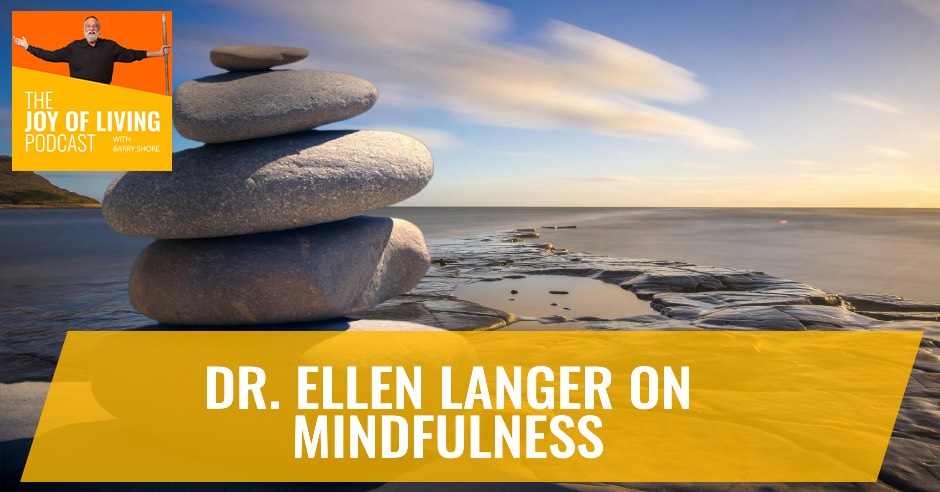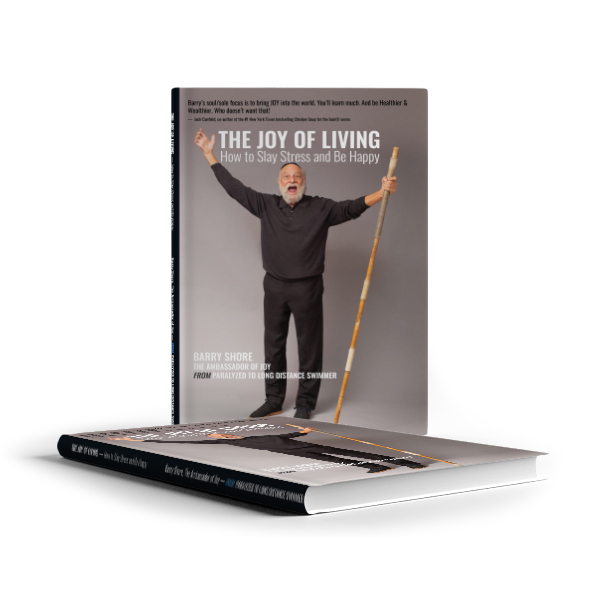Share This Episode

Transform Your Well-Being: Dr. Ellen Langer on Mindfulness and Health
In this episode of The Joy of Living Podcast, host Barry Shore is joined by the brilliant Dr. Ellen Langer, a Harvard psychologist and expert in the field of mindfulness. Dr. Langer shares transformative insights on how mindfulness can significantly improve our health and well-being.
Through captivating stories and powerful examples, Dr. Langer explains how simple shifts in mindset can lead to remarkable changes in chronic illness, stress management, and overall happiness. She discusses how paying attention to the variability of symptoms, rather than accepting them as constant, can empower us to take control of our health and healing journey.
Barry and Dr. Langer explore the incredible mind-body connection, emphasizing how the way we think can influence our physical condition in profound ways. With a blend of science, personal stories, and practical advice, this episode offers actionable steps to live a more mindful, joyful, and healthier life.
Tune in for an enlightening conversation that will inspire you to harness the power of mindfulness and make a lasting difference in your life.
Listen Here (click here to watch episode)
Sponsors:
Water, wonderful, clean, delightfully tasting water. So good because it keeps you healthy and your family and your friends and your pets. I use an AquaTru water filter. AquaTru water filter is a four-stage reverse osmosis purification process. And the best thing I love about it is no installation or plumbing. I got it. I sent it to my home and I was able to set it up so easily and it works and it removes 15 times more contaminants than any regular filter they ever had. And the great news is the filters are affordable and long lasting. You don’t change in every two or three months. They’ll last from six months, maybe even two years. And the result of that is that one set of filters will give you over 4,000 bottles of water. That’s less than three cents a bottle. Today, my listeners, to the joy of living, you’re gonna receive 20 % off. That’s right, 20 % off any Aqua True Purifier. Enter the code JOY at checkout. Go to AquaTru.com
Show Notes:
[11:20] Changing Mindsets and Unlocking Potential
- A study focused on chambermaids, women cleaning hotel rooms daily, revealed a mindset shift.
- When asked if they get enough exercise, these women said no, believing exercise only happens after work.
- Half of the women were taught that their cleaning work was just as beneficial as exercise.
- The two groups didn’t change their eating habits or work harder, but their mindset shifted.
- By the end of the week, the women who embraced the idea that their work was exercise showed significant physical improvements.
- They lost weight, improved their waist-to-hip ratio, reduced their body mass index, and lowered their blood pressure.
- This experiment demonstrates the power of perception. A simple mindset shift led to real health benefits without any extra effort.
- Our abilities are often greater than we realize, and simple shifts in perspective can unlock them.
- This underscores the importance of breaking free from mindlessness and embracing a mindset that sees potential in everyday activities.
[20:20] The Power of Mindset and Choice
- Dr. Ellen shares her belief that happiness can be achieved in any circumstance.
- Stress, often seen as inevitable, is actually psychological and can be managed with a shift in perspective.
- The key to reducing stress lies in how we view and interpret events, not the events themselves.
- Emotions are choices, and how we respond to situations can determine our emotional state.
- A major study involving cancer patients revealed that stress levels might be more significant to recovery than genetics or treatment.
- Being mindful allows for multiple interpretations of events, helping us see how challenges could actually benefit us.
- In contrast, a mindless approach limits us to a single, often negative view, leading to stress and emotional reactions.
- Small actions, like reframing stressful events, can make a big difference in reducing anxiety and finding peace.
- Dr. Ellen emphasizes the power of choice, using a nursing home study to show that those who had choices in their lives were twice as likely to survive compared to those without choices.
[31:33] The Power of Mindfulness and Perspective
- Dr. Ellen shares her personal story of overcoming paralysis after being told by doctors she would likely never walk again.
- Instead of accepting this outcome, she focused on controlling what she could, maintaining a positive and purposeful mindset.
- She emphasizes that life is made up of moments, and if we make each moment matter, our lives will be meaningful over time.
- Dr. Ellen challenges the idea of a “bucket list,” suggesting that true happiness comes from being present and content with the present moment.
- She explains that needing a vacation can be a sign of living mindlessly and not enjoying the work or life we’re currently engaged in.
- Being mindful allows us to notice new things in everyday life, making the experience richer and more fulfilling.
- The practice of mindfulness benefits both mental and physical health by actively noticing and engaging with the world around us.
- Dr. Ellen shares the story of her father teaching her to appreciate life by seeing things as if for the first time, which changed her perspective and helped her notice things she had never seen before.
- This approach, which focuses on presence and mindful observation, is not only enriching but also promotes well-being and health.
[44:03] The Importance of Mindfulness in Health Management
- People with chronic illnesses often believe their symptoms will remain the same or worsen, but Dr. Ellen emphasizes that nothing in life moves in only one direction.
- Just like the stock market, health can fluctuate, improving or worsening at different times, and recognizing this variability is key to managing health effectively.
- Many times, people hold their symptoms as constant in their minds and fail to notice the subtle improvements or setbacks that naturally occur.
- Dr. Ellen introduces a treatment called “attention to symptom variability,” which is simply about being mindful and noticing changes in symptoms.
- By engaging in this process, patients feel empowered rather than helpless, as they actively monitor their health instead of passively accepting it.
- Recognizing even small improvements in symptoms can boost hope and motivate individuals to continue their healing journey.
- Asking “why is it better now than before?” leads to a mindful search for answers, which itself can positively impact health, even if the reason isn’t clear.
- Dr. Ellen believes that looking for a solution to health issues rather than passively accepting them increases the likelihood of finding a cure.
- This approach is not limited to chronic illness—stress, for example, also fluctuates, and recognizing its ebbs and flows helps people manage it more effectively.
[47:2] Engaging in Your Health Journey with Mindfulness
- Dr. Ellen emphasizes the importance of regularly checking in on symptoms to notice any improvements or changes, which helps maintain control over health.
- By setting reminders to track symptoms periodically, patients engage in their own healthcare, feeling useful and involved in the process.
- This approach complements medical treatments without interfering with them, offering an additional, non-invasive way to manage health.
- Studies have shown that patients with chronic conditions like multiple sclerosis, Parkinson’s, arthritis, and chronic pain report symptom improvement through mindfulness practices.
- Mindfulness allows people to see their health as something they can influence, rather than passively accept, which leads to real positive changes.
- Dr. Ellen introduces the concept of “symptom variability,” encouraging patients to notice and reflect on how their symptoms improve or worsen over time.
- Engaging in this mindful process can increase hope, as patients realize their health is not static and that there is always potential for improvement.
- The process of asking “why is it better now?” triggers a mindful search that can lead to insights about health and may even reveal potential cures.
- Dr. Ellen shares personal stories to illustrate how the mind’s influence on the body can create significant changes, such as overcoming illness or even making oneself sick through belief.
Insider Tips:
Nicole Iny is the Executive Director of Grants and Consumer Education at FAIR Health, a national, independent nonprofit organization that qualifies as a public charity under section 501(c)(3) of the federal tax code. FAIR Health possesses the nation’s largest collection of private healthcare claims data, which includes over 47 billion claim records. It is dedicated to bringing transparency and integrity to healthcare costs and health insurance information through data products, consumer resources and health systems research support.
Topics:
- What is FAIR Health?
- What types of tools and resources are offered on FAIRHealthOlderAdults.org?
- What obstacles do older adults and family caregivers face when navigating the healthcare system, and what strategies can they use to find the services and support they need?
- Have you received any feedback from patients and/or their caregivers about the shared decision-making resources available on the FAIR Health consumer website?
- Where can patients, family caregivers and healthcare providers find more information?
Important Links:
About Dr. Ellen Langer
Ellen Langer is widely known as the mother of mindfulness. She is the author of thirteen books, including the international bestseller Mindfulness. Her most recent book is The Mindful Body: Thinking Our Way to Chronic Health. She has authored more than 200 research articles. Her trailblazing experiments in social psychology have earned her numerous awards and honors, including a Guggenheim Fellowship, four Distinguished Scientist awards and the Liberty Science Genius Award
A member of the psychology department at Harvard University and a painter, she lives in Cambridge, Massachusetts.

